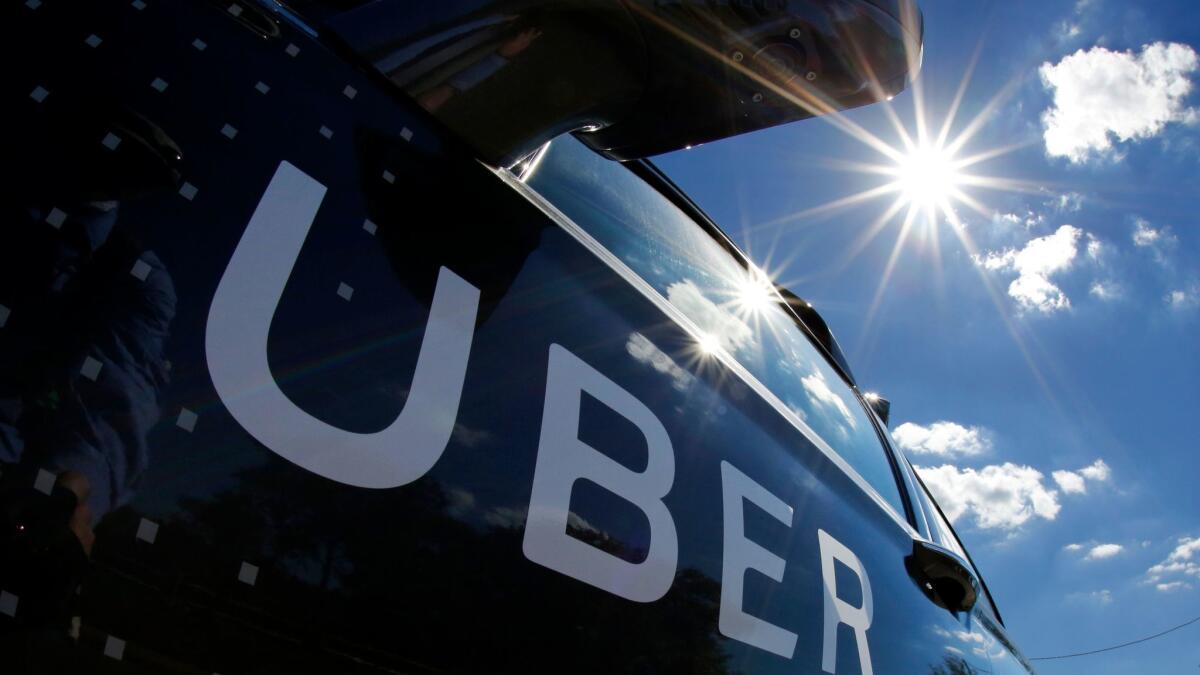After Travis Kalanick’s resignation, can a new CEO move Uber forward?

- Share via
With $6.5 billion in annual sales and 12,000 employees around the world, Uber Technologies hardly resembles a blank slate.
But that’s the pitch — long-awaited in some of its investors’ and employees’ eyes — that Uber can now make with this week’s resignation of Chief Executive Travis Kalanick.
Under Kalanick, the 8-year-old San Francisco start-up allegedly became a place where complaints of sexual harassment went uninvestigated, stolen trade secrets were put to use, executives were allowed to mishandle medical records and a program was developed to circumvent inquiries from public officials.
Now, Uber board members and executives are launching a search for a new chief who they view as having a broad canvas to craft a fresh narrative and inspire an improved culture. To them, Kalanick’s departure and the company’s moves in recent weeks to oust 20 problematic employees should give job candidates confidence about the commitment to moving past months of scandal.
But management experts fear that Kalanick’s continuing presence on the board and significant stake in the company may still be major detriments, sparking speculation he could make a comeback someday as Apple co-founder Steve Jobs did after he resigned.
Despite a wide array of executive-level job openings, Uber’s new CEO also may not get to pick each lieutenant, and there’s no certainty that the company can find someone with both the rigor and vision to drive Uber into its next generation.
“They’re going to need a strong leader with experience building disruptive businesses, and not every CEO can do this,” said Bill Simon, a senior executive at Los Angeles-based Korn Ferry International, an executive recruiting organization. “The board has to develop a very strong point of view about the kind of leader they want, not just in terms of experience and skills, but in values and philosophy.”
Kalanick’s resignation was met with significant division among employees and shareholders of Uber, which through private fundraising has been valued at near $70 billion. Some fear that without a co-founder as CEO, a role which Kalanick assumed about a year in, that the company will struggle to generate the crucial two-moves-ahead insights needed to ward off competition.
“Whether it’s autonomous vehicles, trucking, flying cars — that’s the stuff that I think you really need Travis for,” said venture capitalist Bradley Tusk, an early Uber investor and advisor.
He worries investors who wanted Kalanick gone are prioritizing short-term gains that could undermine Uber’s ambitions. “It’s about the long term. If they replace him with a safe bet, it probably gets them to an IPO faster,” said Tusk.
Investors who supported the resignation are betting that a new hire’s increased expertise in finance and organization will offset the loss of Kalanick’s intimate knowledge of the company and industry.
Uber brought in-house its long-time external consultant, Harvard business professor Frances Frei, to help set the foundation. She’s working closely with 14 executives across departments who are collectively running Uber until a new chief is tapped. The management council is working in tandem with board of director subcommittees — each tasked with vetting candidates for different positions — to fill vacancies created by executives fleeing in the last year.
It’s unclear how far along they are in their searches, but it’s possible some high-level hires could happen before a CEO is named.
“If the board doesn’t act quickly and decisively, this executive merry-go-round can lead to a crisis of confidence,” said Joseph Daniel McCool, principal of the McCool Group, which advises companies on recruitment and succession planning.
“This is a new-economy company that is learning some old-school lessons about leadership, succession and aligning leaders with the culture,” added McCool, co-author of “Board Games: Straight Talk for New Directors and Good Governance.”
Despite months of scandal, the chief executive position of the world’s most highly valued start-up is expected to be coveted. The company could well define the next generation of transportation as it races to develop self-driving vehicles and create software to connect people with transit faster and cheaper.
The search could draw auto, airline, logistics and tech leaders, including former CEOs Alan Mulally of Ford, David Cush of Virgin America, D. Scott Davis of UPS and Marissa Mayer of Yahoo.
And experts expect an outsider to be chosen.
“Given that some of these issues are self-inflicted cultural issues … the board would be looking heavily externally for someone to come in with a fresh perspective,” said Jason Schloetzer, professor at Georgetown’s McDonough School of Business.
Candidates will have to get past Kalanick’s ongoing role as a board member. Creative visionaries have clashed with replacement leaders, including this year when Ralph Lauren’s CEO left because of strategy disagreements with the apparel maker’s namesake founder and chairman.
People close to the company, including those favoring and opposing the ouster, say Kalanick will be just one voice at a table of nine in the boardroom. Its chairman remains Uber co-founder Garrett Camp.
“Change is healthy, and needed,” Camp, long seen as a Kalanick ally, said Wednesday afternoon on Twitter.
Kalanick’s outsized voting power can give him significant sway over decisions, such as when to go public and what companies to buy. And there’s no way to rule out Kalanick’s potential return to an operational role should Uber suffer further turmoil in the coming years, as happened to Jobs at Apple and more recently Jack Dorsey at Twitter.
Kalanick’s resignation was viewed as a strong signal by other shareholders that he doesn’t want to do anything to slow down the company’s move to its next chapter, sources said. When company-hired investigators published recommendations on how to rebound from troubling management and employee exodus, chief among them was a lesser role for Kalanick. The change now enacted, more people may be more willing to at least hear out Uber’s offers — whether they’re drivers, passengers or job candidates.
“Page has been turned, who picks up this valuable ‘ball’ and moves towards its great potential?” Brent Granado, a general partner at Uber shareholder Sway Ventures, posted Tuesday on Twitter.
Steve Vassallo, Foundation Capital general partner, said Uber has to focus on turning its nearly $3 billion annual loss, which excludes items such as stock-based pay, into profits. Kalanick may have been good for wild, intoxicating growth. But slow and steady may win out now.
“It’s not always the troops that storm the beaches that are the right ones to set up the government,” Vassallo said. “That’s the case here.”
Finding a qualified executive could be difficult for a company in the midst of a crisis. Searching for executives can be an arduous process even for long-established, successful firms with relatively stable management, such as Walt Disney Co., which has struggled to identify a successor to its chief.
Simon expects the Uber board will want to make a decision within 60 days.
“This is an opportunity for the leadership and board of directors to reestablish Uber as a leader in its space and be a successful enterprise commercially,” he said. “It’s an opportunity, and it’s an urgent opportunity.”
Times staff writer Tracey Lien contributed to this report.
Twitter: @peard33








